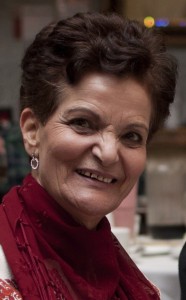The Rasmea Odeh case starts in 1948 when she was one years old and was forced to with her family to flee their home because of Israeli soldiers. The family had to flee to the Jordanian controlled West Bank of Palestine. When they fled they left behind their home and most of their possessions. In the West Bank they made a new home but her father had to move to the United States for work and sent money back to support his family.
In 1967 the Israelis invaded the West Bank and Rasmea and her family were forced to live under occupation. In 1969 Rasmea was arrested for a series of bombings by the Popular Front for the Liberation of Palestine. This is a charge that she denies. Also arrested were her two sisters one whom was disabled. As is the normal practice of the Israelis once she was arrested the army destroyed her home which left her family homeless. At the time of her arrest Rasmea was an active supporter of the Palestinian resistance against occupation.
For twenty-five days she was tortured by the Israeli military. The tortured consisted of daily beatings, sexual abuse and electric shock treatment. This consisted of placing electrical cables all over her body and turning on the electricity. After twenty-five days Rasmea signed a confession so the torture would stop. She was taken brought before a military court where she was found guilty and sentenced to life in prison.
In 1979 there was an Israeli Palestinian prisoner exchange and Rasmea and other women were taken to Geneva where they were released. After release Rasmea spent time in several middle east countries completing her education.
In 1994 Rasmea applied for a permanent resident visa to enter the U.S. so she could take care of her father who was seriously ill. She then moved to the Detroit area after her visa was approved. Upon her father’s death she applied in 2004 for U.S. citizenship and eventually moved to Chicago. After a short time in Chicago she started working for the Arab American Action Network. This organization provides social services for the Arab community. Eventually Rasmea became nationally known for her work with Arab women to help them assimilate to life in the U.S.
In September of 2010, there was an F.B.I. raid in Chicago and the Twin Cities. Houses were ransacked and documents, photos and books of activists who supported the cause of the Palestinians were taken. Even the writings of these activists children and their childrens’were seized. One of the people whose home was raided in Chicago was Hatem Abudayyeh the director of the Arab American Action Network where Rasmea works. Five years have passed since the raid and no one has been charged with a crime.
But in 2013 Rasmea was indicted for giving false statements to procure naturalization. Her case is pending in Detroit because she applied for naturalization in Michigan. National Lawyers Guild attorneys came to her defense including two Chicago attorneys, Michael Deutsch who is the lead attorney and Jim Fennerty.
Pretrial motions were filed by both Rasmea’s attorneys and the government which were contested by both sides. Rasmea’s attorneys retain an internationally known expert in torture. A pretrial hearing was held where the expert testified that that Rasmea because of her torture Rasmea suffers from post traumatic stress syndrome. Because of the PTSD it may have affected Rasmea’s ability to answer questions on the naturalization forms correctly.
There was much fighting in court if false procuring of naturalization was a general or specific intent crime. If the court ruled it was a general intent crime then the expert could not testify. If the court ruled that it was a specific intent crime then the expert could testify at trial. At first the judge ruled in favor of the defense and held that it was a specific intent crime. On a motion to reconsider by the government the court reversed the original ruling and held that falsely procuring naturalization was a general intent crime.
Because of the court’s reversal Rasmea’s torture expert was not allowed to testify and Rasmea was not allowed to testify at trial that she was tortured. Also at trial Rasmea was not allowed to testify that she was innocent of the crime she was convicted of in Israel. `And she was not allowed to testify that because of the torture she suffers from PTSD.
At the end of the testimony at trial Rasmea the jury found Rasmea guilty and the judge sentenced her to 18 months in prison. Following the end of her prison sentence she would be turned over to ICE where she would be deported. Rasmea was later released on bond pending appeal.
On October 14, 2015 oral argument was held on the appeal in the 6th Circuit Court of Appeals in Cincinnati. The appeal argument went well with the Court concerned about the denial of the expert testimony. We are hopeful that the Court will send this case back to the trial court for determination of whether or not the expert testimony is relevant. If he decides that the testimony is admissible, Rasmea will be afforded a new trial.


